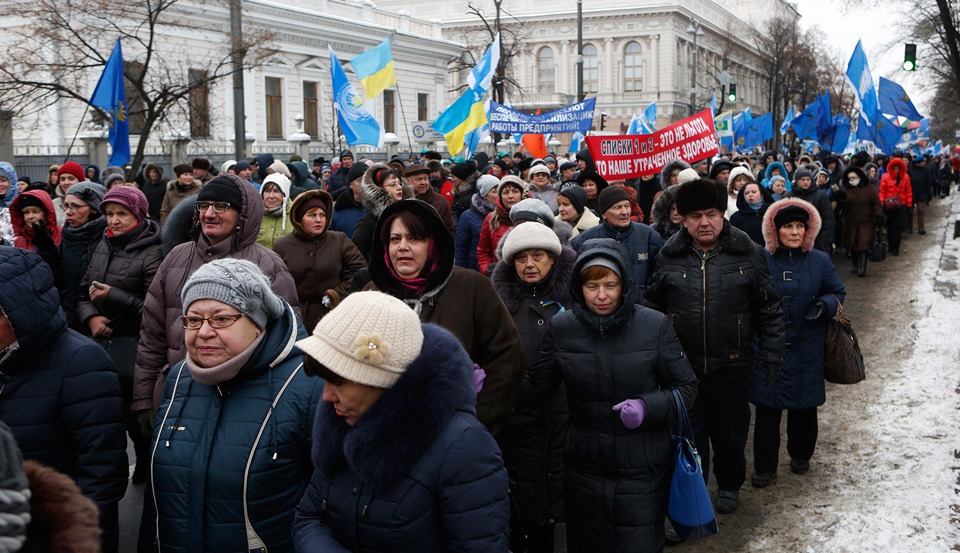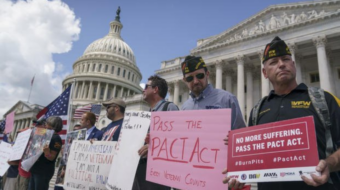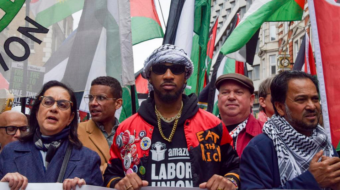
WASHINGTON — Union leaders from around the world met for three days here this week and discussed tactics for countering the right wing’s alarming influence on working people in countries across the globe.
The session was held at the headquarters of the AFL-CIO, as was a similar meeting that took place last May.
As reported in the People’s World, participants in the May discussion – unionists from the U.S. and across Europe – talked about the necessary components of strategies to fight the right wing’s appeal to workers.
This week, union leaders discussed specific programs they are implementing.
Last May, the union leaders agreed that any strategy to counter the appeal of the right wing among working people must include the recognition that workers are faced with distressful changes in the world wide economy. They no longer feel they can count on their futures being secure.
At that meeting, Damon Silvers, the AFL-CIO’s policy director, said the economic instability driving workers to “support right wing authoritarians like Donald Trump” stems directly from the failure of the “worldwide market-based utopia” promised by neoliberals.
Participants agreed that unions must develop workable alternatives to right wing “solutions.” These alternative must truly address the problems workers are facing and workers themselves must be involved in crafting them.
Damon also said that unions should not make compromises with political candidates. He said, “We must insist that candidates we support are committed to full employment and economic security for all.”
Programs to fight the right
This week’s gathering included unionists from Belgium, Argentina, Tunisia, the Ukraine and Germany, as well as representatives from the AFL-CIO. It was sponsored by the International Trade Union Confederation.
Ukrainian unionist Olesia Briazgunova said that in her country defeating right wing populism requires unions “to protect not only labor rights, but all human rights.”
She declared, “We don’t care about ideology, because we are trying to unite all people, especially young people.”
Belgian delegate Goda Neverauskite said that some European unions are establishing programs to specifically organize migrants and refugees. She said this helps to lessen the fear felt by long standing union members and makes them less susceptible to right wing propaganda.
She also noted that organizing migrants helps them integrate into their adopted nation’s civil society, helps unions grow and raises living standards for all.
She added that many young workers “don’t believe in solidarity and in the power of a movement.” To counter the appeal of the right, she said, “We have to show [young people] the power of solidarity and of being together” through concrete victories that aid them and their future.
Kholoud Mannai of Tunisia noted that two years ago her union federation – mostly public sector workers – led a long general strike in favor of democracy, non-discrimination and the country’s constitution. This helped hasten the downfall of the dictatorial president. Now unions are struggling against a coalition government dominated by the right that is privatizing more and more of the North African nation’s economy.
Mannai said that the most effective way to fight right wing populism is to organize.
She said this will also help ensure the future of organized labor in Tunisia because “53 percent of the workers in the private sector are young people.”
Manni stressed that “we have to find allies in civil societies and among (other) non-governmental organizations.”
Most important, Manni maintained that the current mistrust of politicians and political parties among workers has created an opportunity for unions to fight for alternatives to current economic systems.
Tactics of the right
Participants in the meeting all agreed that that corporate interests are behind the right wing upsurge and that corporate-backed politicians pit worker against worker through exploiting fear of the “other.”
In many cases, instead of relying on politicians, corporate leaders themselves are running for office. For example, Marcello Macri has been elected Argentine president, multimillionaire Petro Poroshenko won for Ukrainian president, and real estate magnate and reality-show star Donald Trump has captured the U.S. presidency.
Matias Zalduendo of Argentina described how in his country the right skillfully disguised its true stands through a simple message that appealed to people’s fears, instincts and economic insecurity. Macri “didn’t say everything he would do. He lied to the people,” Zalduendo said.
Carmen Berkley, director of the AFL-CIO’s Civil and Human Rights Division, urged all participants in the meeting to continue to coordinate their efforts because, she said, “There are so many similarities as to how the right has deceived voters worldwide.”
The Ukraine’s Briazgunova was optimistic. “Trade unions can achieve this goal” of solidarity to fight the right “because we are organized around common values,” she said.











